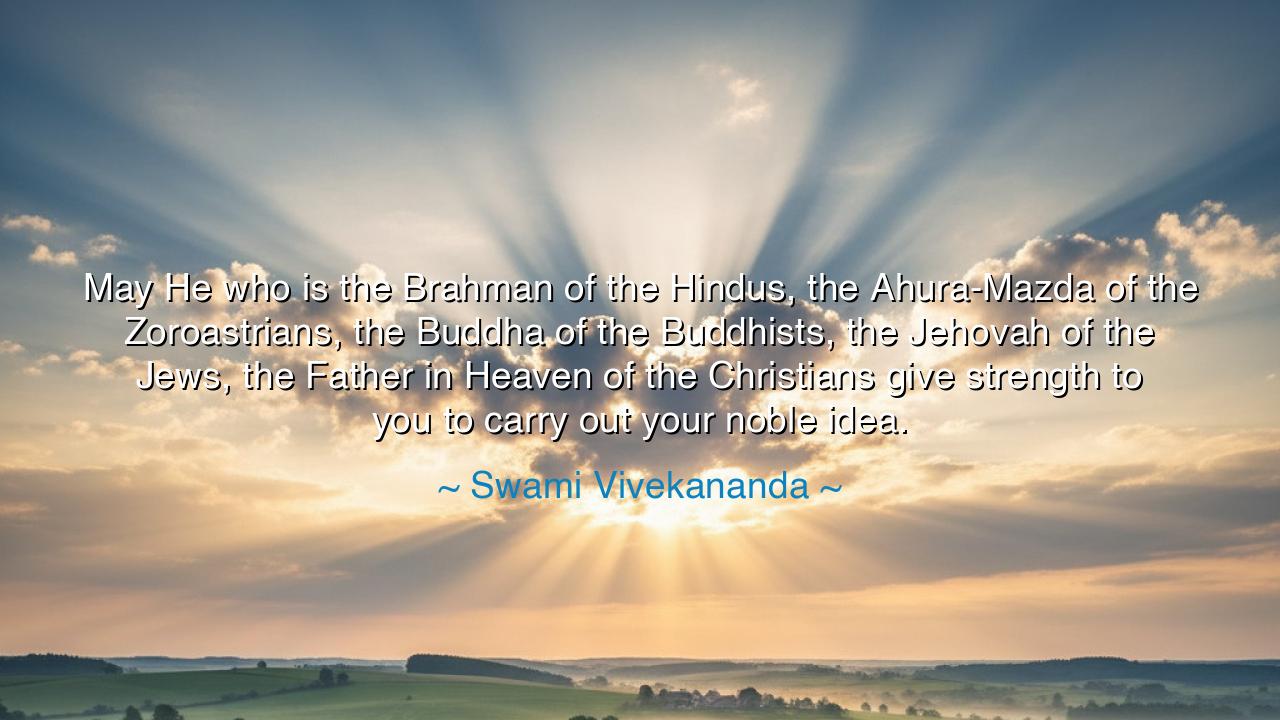
May He who is the Brahman of the Hindus, the Ahura-Mazda of the
May He who is the Brahman of the Hindus, the Ahura-Mazda of the Zoroastrians, the Buddha of the Buddhists, the Jehovah of the Jews, the Father in Heaven of the Christians give strength to you to carry out your noble idea.






Hear the words of Swami Vivekananda, seer and herald of the modern age, who spoke with a voice that bridged the gulfs between nations and faiths: “May He who is the Brahman of the Hindus, the Ahura-Mazda of the Zoroastrians, the Buddha of the Buddhists, the Jehovah of the Jews, the Father in Heaven of the Christians give strength to you to carry out your noble idea.” In this invocation shines a vision larger than any creed or boundary, a vision that sees the same divine light shining in many lamps, the same eternal truth spoken in many tongues. Vivekananda, in uttering these words, proclaimed that unity is not the denial of diversity, but its fulfillment, and that all noble work is sustained by the strength of the One who is called by many names.
The origin of this saying rests in Vivekananda’s mission at the end of the nineteenth century, when he carried the wisdom of India to the West. At the Parliament of the World’s Religions in Chicago in 1893, he declared to a gathering of many nations that tolerance and acceptance were not enough—that what the world needed was recognition of the same divine source behind all paths. Thus, his blessing here is not sectarian but universal, for he calls upon Brahman, Ahura-Mazda, Buddha, Jehovah, and the Father in Heaven not as rivals, but as facets of one Eternal. His prayer was for strength—not for himself alone, nor for his people alone, but for all who dared to labor for noble ideals.
History gives us a living mirror of this truth in the story of Mahatma Gandhi. Gandhi, though a devout Hindu, drew inspiration from the Sermon on the Mount, from the Quran, from the Gita, and from the Buddha’s teachings. His struggle for Indian independence was nourished not by the narrow strength of a single creed, but by the vast ocean of spiritual wisdom that transcends division. He prayed as Vivekananda prayed: that truth, however named, would give strength to men and women to endure suffering and to achieve justice without hatred. And in his life, we see the power of such universal invocation.
The heart of Vivekananda’s words lies in his conviction that the Divine belongs to all. Each faith, each culture, each tradition reaches upward toward the same eternal Source. By naming these different visions of God together, he teaches that unity is not uniformity, but harmony. Just as many rivers flow into one sea, so too do many names point to one reality. To draw strength from this shared well is to free ourselves from smallness, to stand upon the unshakable foundation of universal truth.
There is also in this blessing a call to action. Vivekananda does not ask merely for peace or piety—he prays that strength may be given to carry out noble ideas. For what is faith if it does not pour itself into service? To believe in God, whatever name we call Him, is to labor for the good of others, to uplift the weak, to speak truth, to build a world more just and more compassionate. The prayer is not for idle comfort, but for the strength to toil, to endure, and to sacrifice for ideals greater than ourselves.
Think also of the builders of the great cathedrals of Europe, the temples of India, and the mosques of the East. They labored not for their own lifetimes, but for the generations to come, pouring stone upon stone with faith in a vision they might never see completed. Their strength came not from wealth or worldly glory, but from the conviction that they served the Eternal, however He was named. This is the very spirit Vivekananda evokes: the strength that comes when men and women dedicate themselves to something higher than themselves.
The lesson for us is clear: do not divide the Divine into fragments, nor confine truth within the walls of one creed. Recognize the same light in many names, the same Spirit in many forms, and draw strength from this vast ocean to carry out your own noble work. Pray not for ease, but for strength; not for safety, but for courage; not for self, but for the good of all.
Thus, O seeker, remember Vivekananda’s blessing: Brahman, Ahura-Mazda, Buddha, Jehovah, Father in Heaven—all are One. Call upon that One to give you strength, and then rise to labor for what is noble and just. For in this unity lies the power to heal divisions, in this strength lies the courage to endure adversity, and in this vision lies the path that leads not only to personal greatness, but to the upliftment of the whole of humanity.






AAdministratorAdministrator
Welcome, honored guests. Please leave a comment, we will respond soon